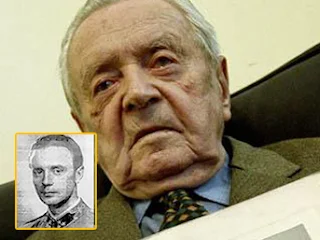(21 April 1913 – 14 June 2011)
Post war flight
Ašner fled to Austria at the end of the war in 1945 and adopted the name George Aschner.Efforts to prosecute
In 2005, Croatia indicted Ašner for crimes against humanity[1] and war crimes in the city of Požega in 1941-42. In February 2006, Austrian judicial officials said they were close to deciding on whether to arrest Ašner. Austrian officials initially ruled he could not be handed over to Croatian authorities as he held Austrian citizenship.[1] However, subsequent investigations by the state attorney's office in the province of Carinthia revealed that he no longer held citizenship in Austria.[citation needed]He remained on Interpol's most wanted list,[2] and was considered by the Simon Wiesenthal Center as the fourth most wanted Nazi at large.[3][4]
In June 2008, journalists reported that, despite the Austrian government's claims that he was in poor health, he appeared to be physically fit based on his presence at a European Championship football match involving Croatia in Klagenfurt, where he lived.[5] This prompted renewed calls for his extradition to Croatia.[6]
The controversial then Governor of Carinthia, Jörg Haider, praised Ašner's family as friendly and said of Ašner that "he's lived peacefully among us for years, and he should be able to live out the twilight of his life with us". This provoked further criticism, with Efraim Zuroff of the Simon Wiesenthal Center saying that Haider's views reflected "the political atmosphere which exists in Austria and which in certain circles is extremely sympathetic to suspected Nazi war criminals".[1]




No comments:
Post a Comment